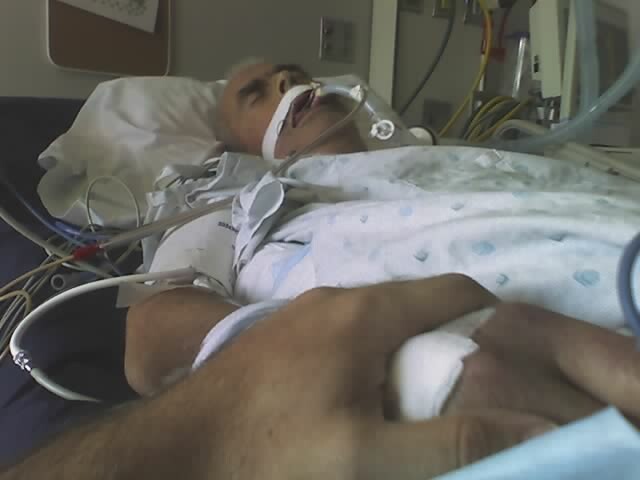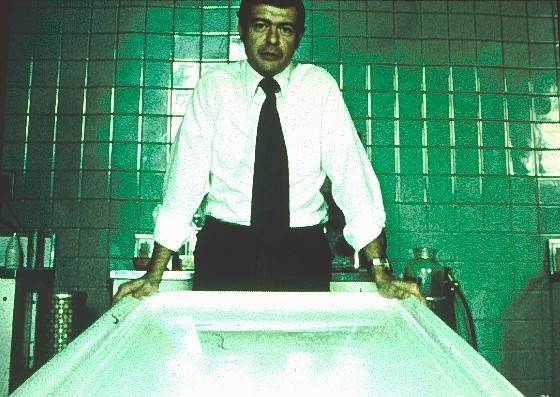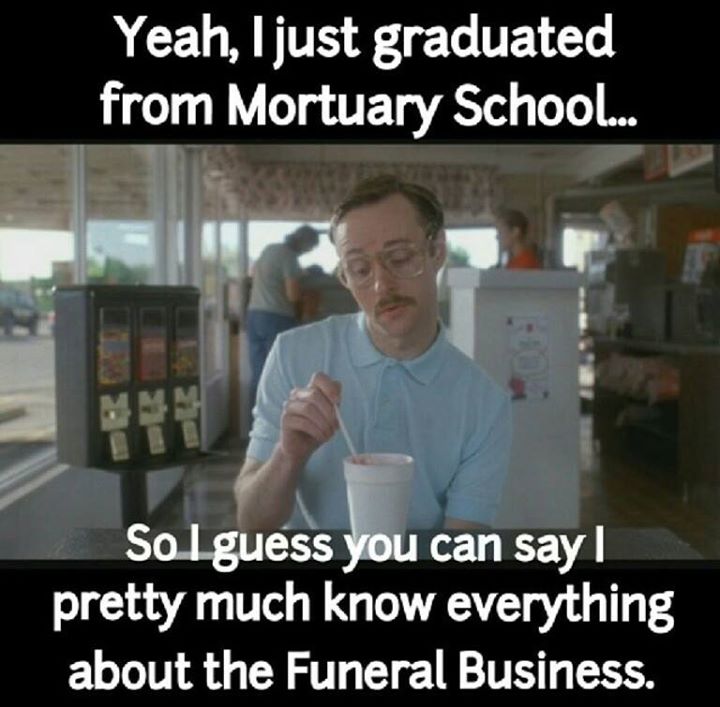Death
Why I Became a Mourning Doula
Today’s guest post is written by Laura Saba:
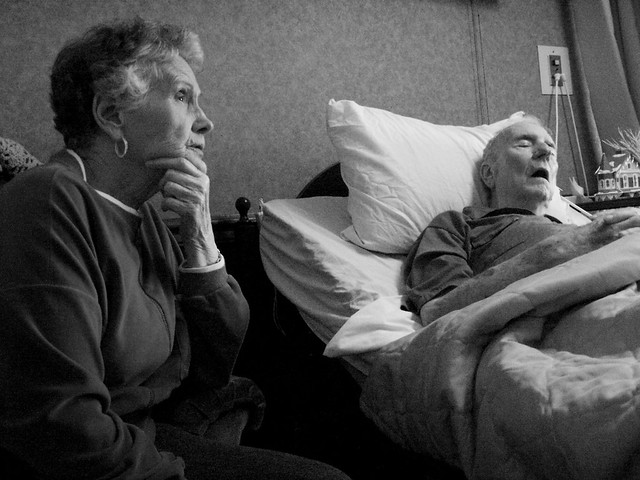
© 2003 Derrick Tyson, Flickr | CC-BY | via Wylio
I’ve been around death A LOT. When I was 4 one of my playmates, a 5 y/o, died of an asthma attack. They buried her and planted a tree at school in her memory. I couldn’t wrap my little brain around it – where did she go, and why did they plant a tree? Was she inside that tree?
A few years later, my grandmother’s tenant died, her body there on the apartment floor. Then when I was 11, my friend and I were about to deliver our newspaper route, when her mom was discovered. She’d had a stroke while leaning over to pull cookies out of the oven. Her face lying on the hot open oven door ’til found was not a pretty scene.
Flash forward to high school and you have the requisite schoolmate suicides, overdoses and car crashes. A few more years spin by and my best friend is murdered in a ”wrong place wrong time” incident, then a few years later my brother was KIA in Iraq (Semper Fi!). Then friends lost to cancer, as well as aging relatives and friends lost along the way.
My work as a birth doula also brought me into the realm of death at times. Soon I was volunteering as a loss doula, for women who would be induced due to a lost baby. There were the stillbirths. Then volunteering with Hospice, as I got really good at working with grief. Along the way I also co-owned a “Grief Gift Basket” business, where we created condolence baskets and our highly popular “Miscarriage Gift Baskets” which addressed the unspoken grief of so many women in a more honest and open way.
Along the way I often stepped in, helping others plan, assisting them as they went to make arrangements. Suddenly I knew the ins and outs of an industry I’d never been in. Too, I saw that supporting people through this process was, in so many ways, calling upon the skill-set of the birth doula, just channeled into a different high-stress time.
It became quickly obvious that people needed an advocate when dealing with this emotionally charged situation. That they needed a 3rd party, not emotionally attached to them or their dearly departed, to advocate for them, to hold their hand, to make necessary phone calls, to run clothing to the funeral home, or help figure out where that green cemetery plot is, precisely. Someone to help them hold it together as they navigate the minutiae in this complicated time – and to ensure they are fully informed, while ensuring they are also physically and emotionally supportive.
It amazed me to see that people responded to this support even more quickly and readily than they initially did to birth doula support. How was it that this Mourning Doula did not exist prior?
I realized it is because in other times we took care of our own dead. Family, friends, our villages rose up and assisted us. As with the birth industry, we need the support because these emotionally sensitive circumstances are no longer handled in the same way, but rather are almost under-the-rug-swept, as we as a culture work to dissociate ourselves from the messy realities of birth and death. Subsequently, there is the potential for someone to take advantage of our vulnerability – not even necessarily out of ill will or greed (though it too often is), but even out of good intentions.
It is simply a fact that no one knows what we would genuinely want if they don’t know us, and aren’t putting advocating for us first and foremost in their mind – especially when there is financial gain involved, it can be all too tempting to sway one in a particular direction over another. Had our culture not distanced itself emotionally and physically from birth and death, if these undertakings had remained undertakings rather than becoming a business, things would perhaps be very different at this time in history. However, as things are, this is how life is in the modern world. We have turned the very bookends that mark our lives into an industry, giving power over some of our most precious moments to others. With power comes at times corruption, and so it is we see the rise of the doula.
*****
Laura Saba is founder of Momdoulary, LLC, which provides training and certification in the Momdoulary Method of both Birth and End-of-life, Mourning, and Death Doula and Midwifery support, and Post-Loss Life Coaching, and Professional Organizing & Management of Material Artifacts Post-Loss.
Laura’s background in life & loss coaching, doula support, FEMA and Red Cross trainings, and experience providing support following natural and terror disasters, coupled with hospice volunteer support, led to a natural combination of her doula and coaching experience to provide end-of-life and post-loss support. This inclination was reinforced by extensive personal experience with loss, beginning at the age of 4 with the death of a playmate, and extending to the loss of a brother in Iraq, and numerous friends and former colleagues on 9/11.
If you’re interested in being trained to be a End-of-Life doula, Mourning doula, Death doula and/or Death Midwife, you can visit Laura’s website, Mourning Doula.
10 Marks of a Good Funeral Director
Over the past couple days I’ve been thinking about the question “what makes a good funeral director?” I wrote down 50 plus characteristics. Then I tried to find 10 that I thought were more essential than the others. Below are those 10.
But, these 10 “essentials” are very much opinion. In reality, the answers are quite relative … relative to a funeral director’s demographic, relative to funeral directors cultural expectations and relative to the funeral director’s personality.
With that in mind, let me be the first to say that this list is horribly inadequate. Nevertheless, here are 10 marks of a good funeral director.
1. Emotional Capital:
Funeral directors are paid to be the stable minds in the midst of unstable souls. We often dwell in the darkness and stare into the void. It takes emotional resiliency to bury a child. It takes emotional capital to bury the mother of three young children. If you don’t have that emotional capital, you’ll go bankrupt.
2. Altruism:
Most of us get our emotional capital by helping others. And although I’ve heard funeral directors say “I’m here to serve” a thousand times, the truth is this: If serving others is the core reason you’re in this industry, if service is your “calling”, you’re doing it right.
3. Continuing Education:
I’ve actually learned a thing or two at continuing education courses. But, I’m not talking about those mandated course hours here. I’m talking about the fact that a good funeral director (like in every field of life) always has a desire to expand their understanding. A good funeral director is alway considering new perspectives and challenging their mind to think outside the proverbial box.
4. Business Savvy (specifically for managers and owners):
The more money you can save the more of those savings can be passed back to the customer. Too often it is the mismanaged funeral homes that end up having to charge exorbitant amounts of money in order to support their bad business decisions.
5. Good Teachers
You don’t know everything. You will never know everything. You will always need teachers in your life.
6. Good co-workers/bosses/employees:
The funeral industry isn’t like the NBA where one player can take over and win the game nearly on their own. The funeral industry is more like the NFL. Sure, there are franchise players, but it’s much more of a team sport. And if you’re playing on a bad team, it’s really hard to do your job well. But, if you’re on the right team, your gifts can shine.
7. Internal Locus of control.
“Internal locus of control” is a more technical way of saying “a person with a high sense of personal responsibility.” This business moves too fast for us to always be dependent on our bosses. And at time, this business most so slow that you’ve got to look for things to be do. The blame game doesn’t work in this industry.
8. Empathy and sympathy.
Imagine being at the bottom of a deep, dark hole. Peer up to the top of the hole and you might see some of your friends and family waiting for you, offering words of support and encouragement. This is sympathy; they want to help you out of the pit you have found yourself in. This can assist, but not as much as the person who is standing beside you; the person who is in that hole with you and can see the world from your perspective; this is empathy. — Dr Nicola Davies
There are times (at funerals especially) when all we can give is sympathy. When it’s outside of our ability to fully empathize with a person’s situation. After all, the person laying in the casket isn’t my father. This isn’t my daughter. This isn’t my family.
And that’s our job. You pay us to be directors. And we couldn’t handle much more. We have to maintain a certain level of objectivity because there’s only so much pain, grief and heartache we can share until we too start to crash … burn out.
But, there’s other times when you can’t help but be drawn into the narrative, so that you enter the narrative and become a character in the story. Not just a director, but an actual character in the drama of life and death.
Knowing the difference between empathy and sympathy and having the ability of to use both is what can separate an average funeral director from a good one.
9. Integrity.
Integrity is doing the right thing when nobody is looking. The funeral industry is full of closed doors; and many of our jobs are performed behind closed doors. A good funeral directors is respectful in public and in private.
10. Honesty.
Honesty in the funeral industry looks something like this: admitting our mistakes when we’re wrong, doing our best to communicate truthfully to our customers and our co-workers and making sure we aren’t exploiting anyone.
*****
This “list” is missing something … your perspective. What do you think characterizes a “good funeral director”?
SURVIVING GRIEF AND THE HOLIDAYS
Today’s guest post is written by Pastor Dieter Reda:
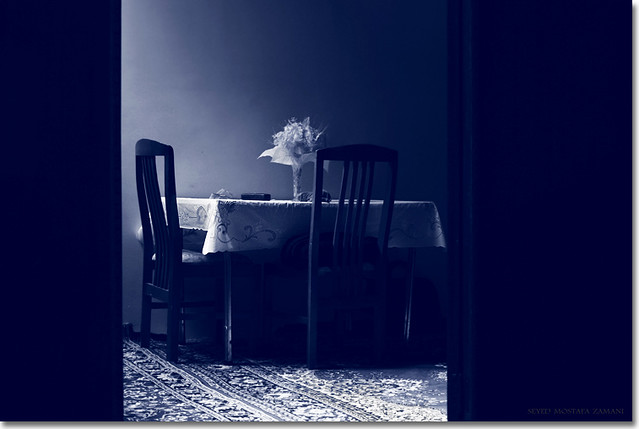
© 2010 seyed mostafa zamani, Flickr | CC-BY | via Wylio
It was one day before Christmas Eve. The casket stood at the front of the decorated church, almost literally under the Christmas tree. In less than 24 hours the place would be packed to capacity and ringing with joyful carols and other festive music. But today it was the scene of the funeral of a prominent church member. In the casket was a 51 year old father of three: two teenagers and a twelve-year old. For them and their widowed mother this scene was surreal. The husband and father had died of cancer. The family had hoped he would at least make it to Christmas. A few days earlier, when I met with them in the home, the widow bitterly remarked, “some Christmas this is going to be.”
What does a young preacher in his twenties say in such a situation? Seminary had not prepared me for this (or a lot of other things still to unfold in my ministry). Fortunately – or not—there had been some preparations. I had been handed a piece of paper, on which were written, in the handwriting of the deceased, Scripture Readings, hymns, and a terse note: “I want you to preach on the following text which I have chosen.” That paper was indeed the framework for the service and it allowed us not to have to comment on the obvious by referring to Christmas.
That was more than 30 years ago. And while I never again had something quite that dramatic, I did have to again and again comfort people who were facing the first Christmas without a loved one, or the last Christmas with a terminally ill family member. And hence, these little pointers.
The first thing I would say is that there is no right or wrong way to handle grief at Christmas, or at any other time for that matter. What is helpful to some, will be useless for someone else. How you choose to handle the holidays will depend on your religious beliefs, your cultural customs, how you are emotionally “wired” and many other factors. What follows is intended only as some pointers to liberate you from the fear of the holidays.
- Don’t let anyone tell you what you should or should not do. It is possible that you will receive unsolicited advice from people who have good intentions, but are lacking in courtesy and tact. Listen if you must, but DO what you think is best and helpful to you.
- Should you “Skip” Christmas? It may surprise some to hear me as a minister say, “by all means—if that is your way of coping.” No one is under any obligation to “keep Christmas”. I reminded my congregation that the early Christian church got along quite fine without celebrating Jesus’s birth, and nobody knows the date on which he was born, except that it more probably than not wasn’t on December 25. If Christmas is just too much to handle emotionally one year, go easy on yourself and dispense with all of it…sending cards, buying gifts, going to parties, or even going to church. The family that I wrote about above did not attend the Christmas Eve service the day after the funeral, and nobody faulted them.
- If skipping Christmas is not for you, then consider a “different” Christmas. While some people take comfort in keeping old traditions alive, others find it more helpful to invent new traditions. Moving the venue of the celebrations can give a fresh perspective on things. I remember the first Christmas after my mother died, we moved the family celebration from my parents’ home to my home. For me the added work was a wonderful distraction and it acknowledged that Christmases would permanently be different.
- Try not to mask your grief. Some people do that by throwing themselves into as much activity and as much merriment as possible. Others avoid mentioning the name of their loved one thinking that will bring “bad luck” or make things worse. But the contrary might be true. Christmas is a nostalgic time and some have shared with me how helpful it was to remember the good Christmases past, even if that brings on tears. You might find yourself crying one minute and laughing the next, even as you remember some of the fun times with your loved one.
- Go Easy on yourself. Particularly if you are the caring and nurturing type who likes to take care of everyone else.
- Accept Gestures of Help and Support. This is a double edged sword. People who are bereaved often feel neglected and left out after the funeral. On the other hand, people have told me how they tried to reach out to bereaved friends only to be repeatedly rebuffed. Finally they gave up. If someone offers to do something for you like provide a meal, a gift, or help with a chore do accept it graciously…or ask for a rain check if the time just isn’t right.
And How Can You Be Helpful to Someone Who is Grieving Over the Holidays?
- Don’t Assume that because someone is in mourning, they want to be Excluded from Social Invitations. Let them make that decision. Perhaps being included, especially in things they used to do with a group of friends, is just what they need. Do invite them, but give them the freedom to decline if that is better for them.
- Don’t Pretend that the Deceased Never Existed. Friends are sometimes afraid to mention the name of someone who died, fearing it will upset the family. The truth is, they are thinking about their loved one a lot, and some have told me how hurtful it is when others behave as if the person was forgotten. Mention the deceased by name, when it would naturally come up in conversation, such as talking about memories – Christmas or otherwise.
- Should I send a Christmas card? There is no right or wrong answer to that. It would depend on what your usual custom is, how close to Christmas the death or funeral is etc. If you always exchanged cards, it might seem unusual to your friend if you suddenly stopped. In addition to the pre-printed prose that comes in the card, a hand-written note that you are thinking of them in a special way will probably by meaningful. As in other expressions of sympathy, avoid clichés, and unhelpful platitudes.
- Avoid saying, “If there is anything I can do, please call”. Most people will not take you up on it, thinking they are imposing or otherwise inconveniencing you. Also many people who say that, do it to ease their own conscience (at least we offered!) even if they have no intention of doing anything. It is much more thoughtful to find a need and meet it. Don’t ask if you can bring over a meal or shovel their snow or whatever. Just show up and do it. Or keep in touch with phone calls, emails, or visits, depending on your relationship. Perhaps you will become aware of something that “you can do”.
- Be Persistent but not overbearing. Be there when you are needed, but give your friends space when they need that. Be a ready and willing listener, but don’t ask prying questions.
- Invitations to small gatherings or perhaps a lunch with just the two of you might be more helpful than a large party (although consider # 1 above)
- Don’t Pretend that Everything is fine like it used to be. This Christmas will be different for your friends, and perhaps it will be difficult. The mirth and the joyful celebration of others may underscore the pain your friend is feeling. Don’t pretend by telling them to “get their mind off things” or say “you’ll feel better if you ….” Help your friend to make the best out of a difficult situation. They will remember your thoughtfulness…or your insensitivity for years to come.
Dieter Reda has been an ordained Minister for the past 34 years and served various churches in central and western Canada. Since 2003 he is senior pastor at Mission Baptist Church in Hamilton, Ontario (Canada). His blog of pastoral musings on various issues is at www.dieterreda.com and you can follow him on Twitter @Dieterreda.
